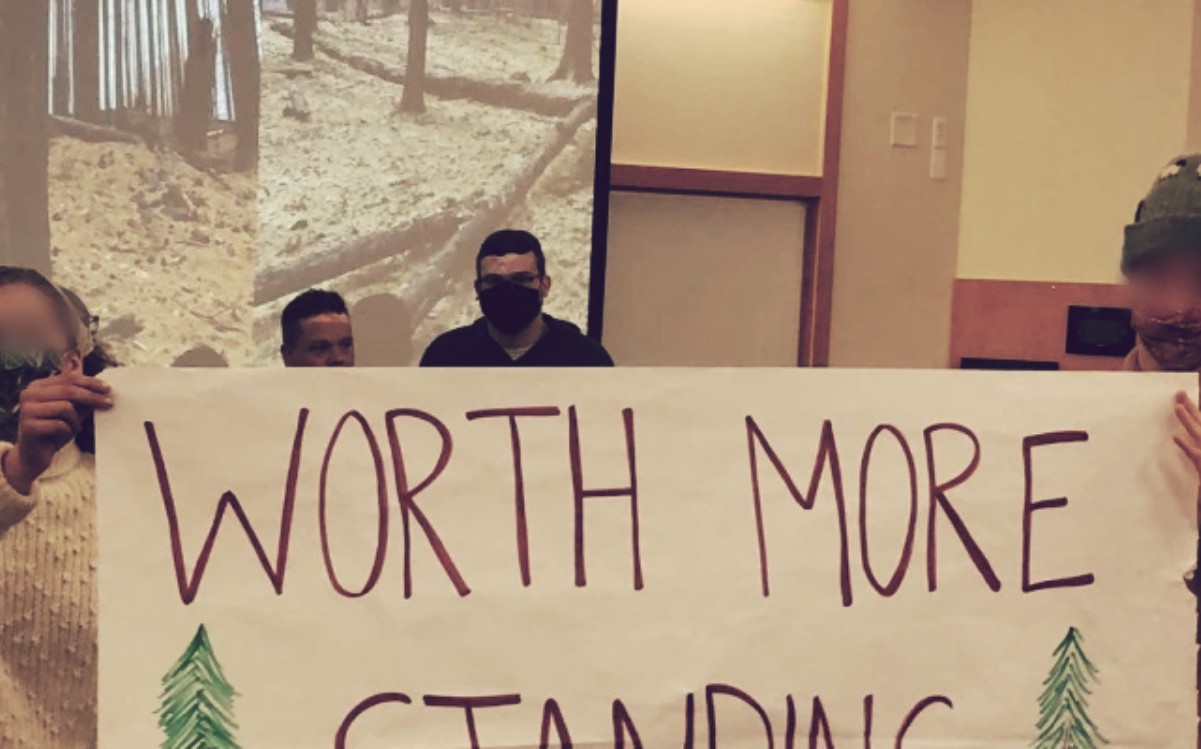Filed under: Action, Environment, Northwest

Report on disruption of lumber industry presentation in so-called Eugene, Oregon.
Eugene, OR – Dozens of University of Oregon students with the campus organization Climate Justice League shut down a presentation by Tyler Freres of Freres Lumber Company today, disrupting the speech and calling attention to the massive environmental impacts of post-fire logging on the climate, drinking water resources, and future wildfire hazard. The students were protesting the huge swaths of public and private forests logged by Freres lumber after the 2020 wildfires, and the corporation’s continuing efforts to greenwash their business.
Courtney Kaltenbach, the Climate Justice League’s Co-Director, said:
We’re not going to let this deceitful propaganda be spewed on our campus when the science is clear: post-fire logging is a scourge on the landscape impacting community drinking water resources and contributing to the climate crisis. We are here to send a clear message to Freres Lumber and all of those who would profit from the destruction of our forests and our climate: we will fight you at every step.
The demonstration comes just one day after community organizers defied a closure order and blockaded a road leading to public forest slated for post-fire clearcutting by Freres lumber in the Breitenbush Watershed of the Willamette National Forest.
Hundreds of acres of lightly burned mature and old growth forest are under imminent threat for clearcut logging by Freres Lumber, even while a federal judge has yet to rule on a strong legal challenge filed by environmental organizations. The logging is planned on public forestland impacted by the 2020 wildfires directly across Highway 46 from the Breitenbush Hot Springs Retreat Center and along the salmon-bearing Breitenbush river, proposed as a Wild & Scenic River. Since the 2020 fires, the watershed has already been significantly impacted by unprecedented public and private lands logging.
“In the year since the 2020 Labor Day fires, the timber industry has leveled hundreds of thousands of acres of burned forest across the state, polluting drinking water, endangering communities, and driving the climate crisis,” said Eloise Navarro, an organizer with Climate Justice League. “There is no doubt that, if my generation even has a future, Freres Lumber and their ilk will be portrayed in our history books as criminals of the worst order.”
you gotta love it when the majority of attendees at a talk are there to disrupt it. these disaster capitalist timber barons have no place in our communities or in our forests.#WorthMoreStanding https://t.co/jkVyzfTkBn
— Cascadia Forest Defenders (@CascadiaFD) November 17, 2021
The Highway 46 project was originally proposed as a green tree timber sale focused on logging young plantation forest with light thinning in mature and old growth stands. A decision was released in 2019 allowing for logging to move forward, after environmental groups had bargained with the National Forest to drop some of the oldest and most ecologically diverse units. Logging had not been completed at the time of the Labor Day windstorm and the rapid spread of the Beachie Creek Fire, which burned through the remaining unlogged units.
This year, organizers discovered that the Forest Service had changed the contracts with Freres on the remaining units from thinning to clearcutting, allowing post-fire logging to move forward without an additional National Environmental Policy Act (NEPA) review and the environmental impact analysis necessary to gauge the increased environmental degradation associated with post-fire logging. The agency advanced these plans with no public announcement in direct violation of federal law.
“Attempting to make a profit off of these critical ecosystems is despicable and nefarious behavior,” said Sara James, an organizer with Cascadia Forest Defenders. “Especially during the climate crisis, Freres Timber has no right to hoard private gains from public forests”
Ecologically devastating post-fire logging has long been opposed by prominent forest ecologists Jerry Franklin and Norm Johnson, often hailed as the primary architects of the Northwest Forest Plan. In a recent opinion piece in the Statesman Journal, Franklin and Johnson wrote “in the wake of the 2020 wildfires, the best approach to ecological recovery is, literally, to let nature take its course.”
The timber sale is in the Breitenbush River drinking watershed, and would have significant impacts to drinking water quality in the Detroit Reservoir. Hundreds of thousands of Willamette Valley residents rely on the Detroit reservoir for their drinking water.





